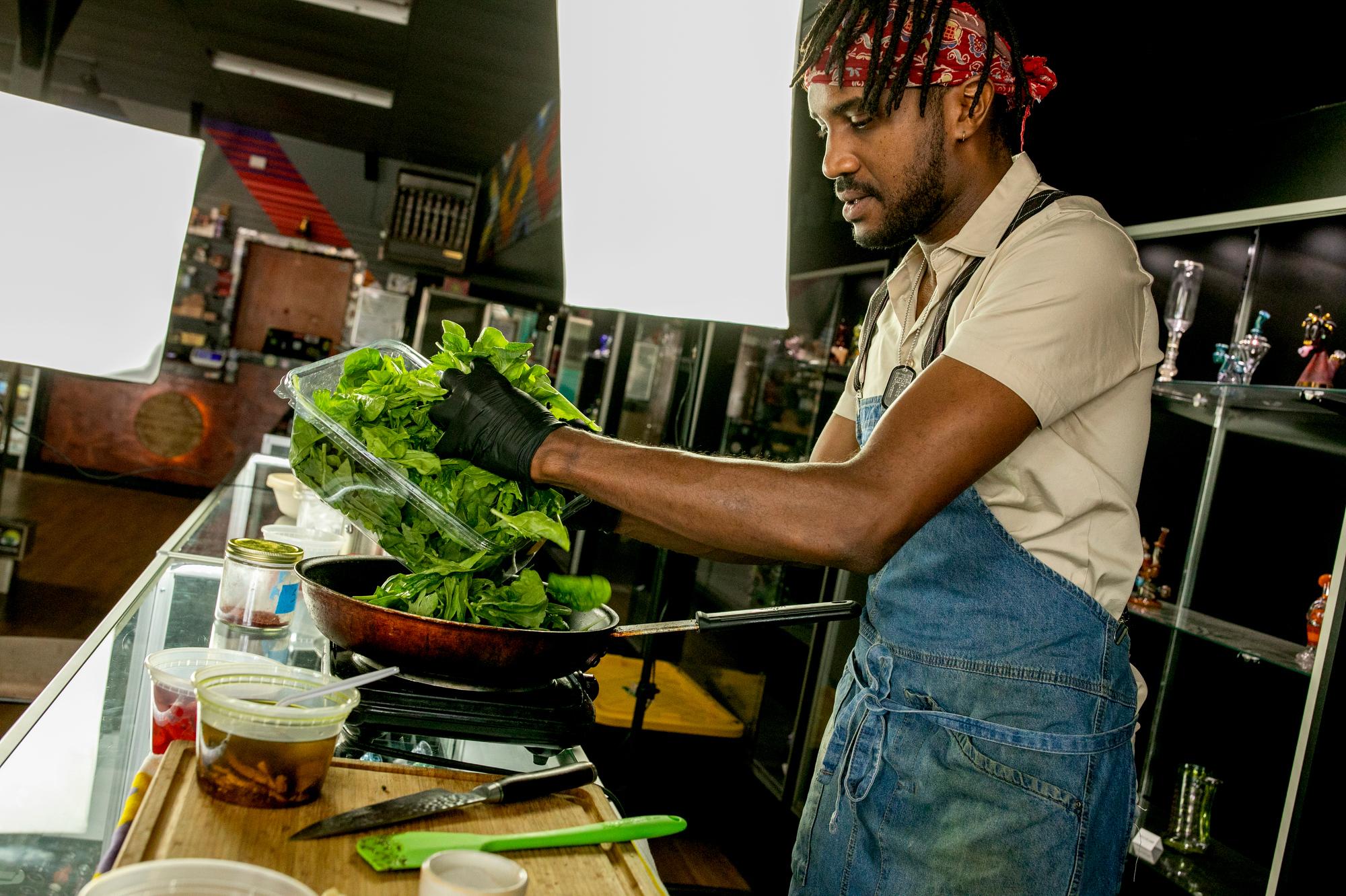April 20, the universally recognized "stoner holiday," hit differently for Harold Sims this year. That day, the Denver-based chef made his world television debut, on Netflix. He was looking forward to finally letting friends and family in on the secret he'd kept for a whole year.
Sims was on Netflix's Cooked With Cannabis, a gourmet cooking competition infused with weed. The streaming service dropped the first season on 4/20. And, apologies for the spoiler, but he won, taking home a $10,000 cash prize in the second episode. The theme was "global eats," and Sims blew away the judges with his inspired riffs on traditional African dishes.
The intrepid chef could have taken that cash and turned it into Denver's next hot restaurant. But even before the pandemic crippled the restaurant business, 31-year-old was wary of opening one himself.
"When you start chefing, people always go, 'alright, you're going to open a restaurant, right?'" he said. "And you go 'no,' and then they go, 'OK, what the hell are you doing?'"
Instead, Sims is personal chefing (with a lot of PPE). He's also been hosting temporary pop-ups where he can serve food with a theme, giving him room to experiment with his dishes.
"The virus kind of exposed a lot of flaws in the restaurant industry," he said. "I've always had this thing about restaurants."
He said a restaurant would stifle his creativity, and he can't get behind paying his employees below minimum wage. When Gov. Jared Polis issued a temporary order ending in-person dining earlier this year, the effects were devastating -- most of all for service workers, who were among the first to lose their jobs.
Sims said that was a disaster waiting to happen.
"This is one of the few businesses where we say, 'you're going to work for $2.50 an hour, and we're gonna rely on the people who come in here to pay you directly with tips and stuff,'" he said. "It's so flawed to me. It's always been flawed."
As Sims told the CPRNews podcast On Something, the response to his Cooked With Cannabis episode was surprising, not because of an overwhelming demand for food with weed in it -- actually, he said, he got very few requests like that. Much more of the interest was in the food itself.
"My hope is to showcase Michelin star quality African cuisine paired with premium cannabis," Sims told the show's judges.
Harold came to Denver after retiring from the Army in 2014, to enroll in culinary school at Johnson Wales. When he graduated in 2016, he started learning to grow his own food and cannabis as a way to become more self-sufficient. It was only natural that the two would eventually overlap in the kitchen.
Growing up, he split his time between Arizona and North Carolina. But as a chef, he buried himself in research to connect to his deeper African roots, even taking a DNA test, which showed that his family descended from the Mali empire, Cameroon and Congo.
Appearing on Netflix brought him a flood of positive attention from African viewers. To him, nothing could be more gratifying.
"It allowed me to feel that it was OK and I wasn't faking because I wasn't actually from Africa, you know, I'm from North Carolina," he said. "And that was a big fear of mine. Because being Black is like, you don't get the benefit of either nation. You don't get the benefit of Africa or America, so you're not quite either. And that was always something that really bothered me. So I had to find my way to give myself permission to be Black, essentially. And that was the way to do it. It was like, OK, well, I cook African food. Like how Black can you be?"
He takes influences from Sudan, Yemen and Nigeria and blends them to make food that is uniquely his.
"That's all people know is Ethiopian food, when they think African [food]," he said. "People go like 'I want African food,' it's the same way as saying 'I want Asian food,' and, like, that's not helping anybody. Do you want Punjabi? Are we going for Szechuan, what are we going for?"
Once the accolades started to roll in, Sims felt some pressure to fill a relative void of African restaurants in Denver with his own establishment. No more than 2 to 3 employees, max, and probably no dining in, giving him more time to focus on the food.
"If I can find a way to open a small carryout or a small bodega kind of feel, where we just sell, like, really nice food and you have a little shop in the back window," he said.












